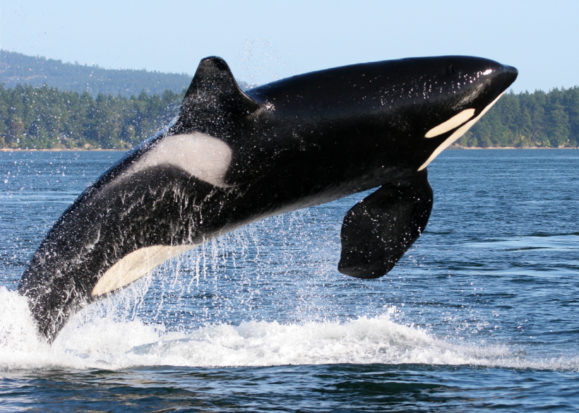
The story of Tahlequah is tragic and heartbreaking but serves to remind us we must keep up the fight to save whales whenever, and wherever, we can. Photo by iStockphoto
The images of the orca Tahlequah keeping her dead calf afloat in Puget Sound while trying to keep pace with the other members of her pod have moved millions worldwide. The calf died on July 24 just half an hour after being born, raising not just global sympathy for Tahlequah’s grief but deeper concern about her particular killer whale population, which has not produced a successful pregnancy in three years. These well-studied animals, just 75 in number now, are in serious trouble. Their main source of food—Chinook salmon—is also struggling to recover. A recent study of Tahlequah’s orca population found that two-thirds of the orcas’ pregnancies failed between 2007 and 2014, likely due to multiple stressors on the females.
Earlier this year, Washington Governor Jay Inslee announced his decision to convene a task force to assess the factors that have depleted this population—called the “southern resident” population—and to recommend action. Tahlequah’s story raises the pressure for action, and that task force has some pretty big issues to consider, including prey availability, toxic pollution, and noise and vessel traffic disturbance—and perhaps even destruction of dams on the Snake River to promote a healthy and robust salmon population.
But a few weeks ago, it was another whale that captured our attention, a whale harpooned by commercial whalers in Iceland who, in the moments following the kill, proudly posed for photographs in the manner of hunters standing next to their trophy animals. Experts viewed the animal and saw what appeared to be a blue whale—a very rare and highly protected species—and not a fin whale, the species that Iceland has issued itself a quota for in defiance of the global moratorium on whaling (the whalers have since claimed that it was a hybrid).
Iceland’s current law on whaling is set to expire later this year and this latest incident has once again focused the world’s attention on this international outlier. A rapidly shrinking minority of Icelanders supports commercial whaling. The industry’s economic significance is minuscule, it mostly benefits one company with one owner, and more and more Icelanders believe that it damages the international reputation of their country. They are right.
These two incidents have drawn international attention and we must seize these painful—but powerful—moments to make the case for whales whenever and wherever we can. In just a few weeks, the International Whaling Commission will meet in Florianopolis, Brazil. We are sending a global team to defend our pro-whale agenda, and we’ll join with other international partners to fight any proposals to scuttle the global ban on commercial whaling.
Commercial whaling is a fight for animals we’ve been waging for decades, and we’re not going to give the whaling nations of Iceland, Japan, and Norway any quarter—in Brazil or anywhere else on earth—when it comes to the defense of these majestic marine mammals. As Tahlequah’s story reminds us, the life of every whale counts.
The post Every whale counts appeared first on A Humane Nation.
Enviroshop is maintained by dedicated NetSys Interactive Inc. owners & employees who generously contribute their time to maintenance & editing, web design, custom programming, & website hosting for Enviroshop.
